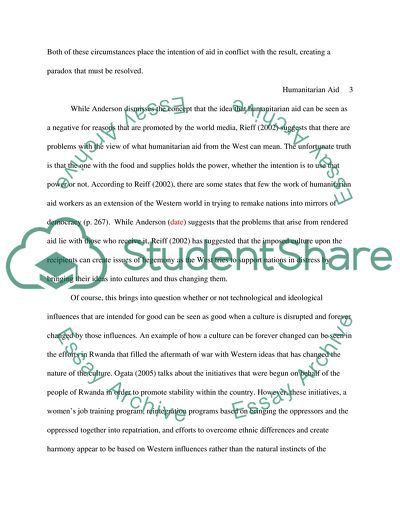Cite this document
(Humanitarian Action Aid: Conflicting Issues Essay Example | Topics and Well Written Essays - 1500 words, n.d.)
Humanitarian Action Aid: Conflicting Issues Essay Example | Topics and Well Written Essays - 1500 words. https://studentshare.org/sociology/1737306-humantarian-action-compare-and-contrast-the-ways-in-which-mary-anderson-thomas-weissmichael-barnett-sadako-ogata-and-david-rieff-describe-humanitarian-challenges-that-have-affected-the-international-community
Humanitarian Action Aid: Conflicting Issues Essay Example | Topics and Well Written Essays - 1500 words. https://studentshare.org/sociology/1737306-humantarian-action-compare-and-contrast-the-ways-in-which-mary-anderson-thomas-weissmichael-barnett-sadako-ogata-and-david-rieff-describe-humanitarian-challenges-that-have-affected-the-international-community
(Humanitarian Action Aid: Conflicting Issues Essay Example | Topics and Well Written Essays - 1500 Words)
Humanitarian Action Aid: Conflicting Issues Essay Example | Topics and Well Written Essays - 1500 Words. https://studentshare.org/sociology/1737306-humantarian-action-compare-and-contrast-the-ways-in-which-mary-anderson-thomas-weissmichael-barnett-sadako-ogata-and-david-rieff-describe-humanitarian-challenges-that-have-affected-the-international-community.
Humanitarian Action Aid: Conflicting Issues Essay Example | Topics and Well Written Essays - 1500 Words. https://studentshare.org/sociology/1737306-humantarian-action-compare-and-contrast-the-ways-in-which-mary-anderson-thomas-weissmichael-barnett-sadako-ogata-and-david-rieff-describe-humanitarian-challenges-that-have-affected-the-international-community.
“Humanitarian Action Aid: Conflicting Issues Essay Example | Topics and Well Written Essays - 1500 Words”. https://studentshare.org/sociology/1737306-humantarian-action-compare-and-contrast-the-ways-in-which-mary-anderson-thomas-weissmichael-barnett-sadako-ogata-and-david-rieff-describe-humanitarian-challenges-that-have-affected-the-international-community.


